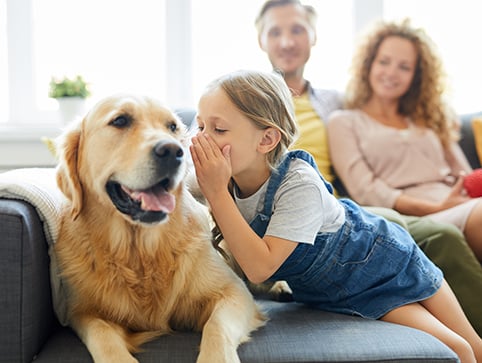Physical Health Benefits of Owning a Dog
The physical health benefits of having a dog are confirmed by the AHA and other health leaders. The AHA reports that in addition to lowering cholesterol, blood pressure, and heart-harming stress, dogs can improve recovery after illness. The AKC cites studies showing a clear correlation between dog ownership and longer life expectancy.
Dogs help with weight-management, too. One NIH study of public housing residents found that those who walked “loaner” dogs lost an average of 14.4 pounds over a year. They saw it as their responsibility to the dog, not just an exercise chore, and felt a sense of being needed.
According to the Human-Animal Bond Research Institute (HABRI), people are happier and healthier when animals are around. Their research review found that interacting with animals results in:
- Healthier breathing rate, heart rate, and blood pressure
- Improved recovery after a heart attack or stroke
- Increase in hormones associated with well-being, including cortisol, oxytocin, b-endorphin, dopamine and others
- Increased time spent exercising by up to 30 more minutes a day
- Reduced muscle tension
Dogs bond with humans and become like family. Some dogs have heroically rescued children and adults from intruders, traffic, fires, drowning, and other dangers. Other dogs have alerted owners and others to medical conditions ranging from pending seizures to undiagnosed tumors.

Do Dogs Think Humans Are Dogs?
Curious pet owners have wondered, “How does my dog see me?” Research is limited. One French study, reported in Scientific American, tested canine participants with names like Cusco, Bahia, Babel, and Sweet. The dogs looked at a series of digital pictures of dogs and non-dogs. The images included pictures of human faces as well as facial photos of domestic and wild animals.
Researchers concluded that dogs can identify and differentiate other dogs, breeds, and humans by sight alone. They seemed to understand who falls into the category of dog and who does not.
Other scientists note that dogs use both sight and smell to size up their surroundings. With over 100 million sensory receptors in the nose, dogs can easily distinguish canine scents from human scents. As domesticated wolf descendants, dogs still love to be part of a pack but are unlikely to think you’re one of their own species.
Responsibilities and Rewards of Owning a Dog
While dogs offer healthy rewards, pet ownership is a big responsibility. Before bringing a pup home, ask trusted shelters, veterinarians, and pet experts about what to expect.
Dogs require attention, care, and commitment. They’re also a sizable part of any household budget, especially if you have children or are budgeting for a baby.
Affordable alternatives may include pet-sitting, dog-walking, training dogs or therapy pets, or caring for the pets of neighbors, family, and friends while they’re away. Doing a little homework in advance helps to ensure mutually beneficial relationships with pets for years to come.





